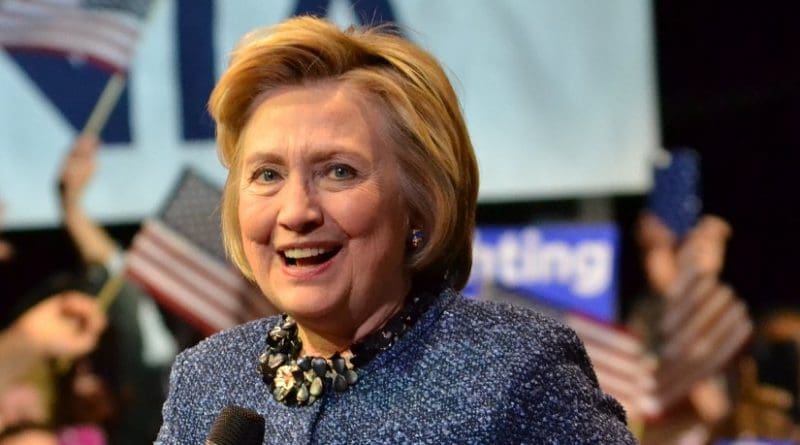What If Hillary Clinton Wins? – OpEd
By Arab News
By Dr. Amal Mudallali*
A Hillary Clinton presidency, if she wins the elections, will not be a second Obama administration on foreign policy as some of her critics seem to think. She will chart her own foreign policy and — if the campaign is any guide — it will be a more Republican-like foreign policy than a traditional Democratic one. As a Democrat, she is considered the “hawkish” candidate on foreign policy, and not the Republican candidate, be it on Russia, Iran, Syria, nuclear issues, and on repairing the relationship with allies.
Clinton is very different from her opponent Donald Trump, especially in experience and temperament. She comes to the job, if she wins, with the most experience that any US president has ever had. From her White House years as a First Lady, to her time in the Senate and secretary of state, Clinton has a domestic and foreign policy experience that equip her to be a formidable president if Congress works with her.
On temperament, Clinton is tough, disciplined, patient, values allies and friends, and is strategic. But her weakness is her “secretive” nature, an outcome of decades in public life.
She seeks advice and listens to her advisers. During the campaign, she has been surrounded by a large group of foreign policy wonks. They are literally the majority in the Washington, if not the American, foreign policy community.
She will make repairing relations with allies as a priority and will try to bridge the “trust deficit” that grew between the US and many of its allies, especially in the Middle East. Michael Morell, former deputy director of the CIA, who is a Clinton supporter, said in a conference in Washington recently that he was optimistic that the next president will have a real opportunity to work with partners in the region to shape the future. It is an opportunity, he said, for the new president to say, “We are back.”
The Center for American Progress, a Washington think-tank which is close to Clinton’s campaign manager John Podesta, put out a report recently charting a new approach for the next president and to the region. If Clinton is elected she is expected to be guided by many of its recommendations and foremost among them a “renewed American leadership in the region away from the crisis management paradigm.” Brian Katulis, the power behind the report, told me that Clinton is likely “to have a more assertive and proactive policy rather than a reactive and cautious one.” But he cautioned this will not happen overnight. “The change will be gradual,” because “she will come to the office with so many challenges in the aftermath of a very bruising election campaign.”
Clinton has been very critical of Russian policy on Ukraine, Syria, and NATO and Europe, and she accused the Russians, from the “highest levels of the Kremlin,” of engaging in “cybertattacks against the United States” to influence the elections. She said Putin has a “favorite in the race,” Trump, because as she put it “he’d rather have a puppet as president of the United States.” If she becomes president the relationship with Russia and how to manage it will be one of the most important and hot issues on her agenda.
On Syria, Clinton has been very supportive of the opposition and against Assad and his war on his population from Day 1. She, along with a number of national security figures, disagreed with President Obama on the Syria policy.
She is advocating a no-fly zone and a safe zone in Syria to protect civilians from Assad and Russian airstrikes. She believes creating these zones will give the US “leverage” and “saves lives and hasten the end of the conflict.”
She said she was aware of the concerns about a confrontation with Russia and Syria calling them “legitimate concerns” but “this would not just be on the first day. This would take a lot of negotiation. It would also take making it clear to the Russians and the Syrians that our purpose was to provide safe zones on the ground.”
People close to her campaign say she is serious on Syria and on the no-fly zone “but it depends on what our allies in the region are willing to do,” and especially on the no-fly zone, the “devil is in the details.”
On Iran, while Clinton will preserve and uphold the Iran deal, she will most likely push back on Iran’s “destabilizing” behavior in the region. She will be tougher on Iran if it continues with its “troubling behavior” and its attacks on shipping and provocation in the Gulf as we saw close to Yemen recently, as one of the advisers to the campaign said. But he did not expect a “strategic shift,” rather she will be “responsive to provocation.” She will send signals, he explained, that will be “thought through but not reckless.” He explained that “one of her regrets has been the lack of response” to the 2009 Green Revolution in Iran, implying that under her watch there will be a different approach, one that is more supportive of the Iranian people.
On the Arab-Israeli conflict, we will see a return to a revised and updated Bill Clinton approach, especially since he is expected to be the adviser in chief for her. President Clinton used to say during his campaign in 1992 that if elected people will “get two for the price of one.” This will be probably true of Hillary’s presidency too. If she wins we will see something like an updated Bill Clinton era foreign policy. But she is in for a rough domestic ride that might sap her energy and put the brakes on her foreign policy.
*Dr. Amal Mudallali is an American policy and international relations analyst.

